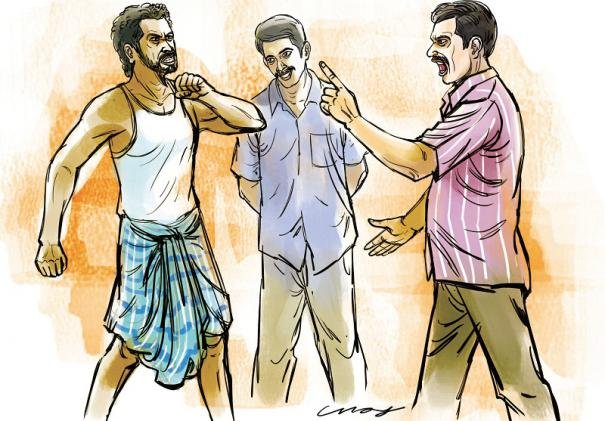Increasing oppression does not justify a compromise
increasing oppression do not justify a compromise
Leena Manimekalai asks an important question about the character of the ‘International Community’ in her recent article in Tehelka. This is, however, not a new question.
The Tamil-speaking world, Diaspora Tamils in particular, is moving ahead in its political understanding and there is a concretisation in defining two types of international communities, one that controls power and the other that comprises ordinary working people.
Tamilnet, a leading English website among the Diaspora Tamils carries number of articles arguing this case. Meena Kandasamy, who Leena argues against in her article, did an interview with Paul Murphy, an Irish MEP, for this website, which explicitly explained the difference. Comprehension of these differences are increasingly widespread.
Indeed, the characterisation of western governments, the Indian state, etc, as standing diametrically opposed to the interests of the people they govern, is correct. However, one cannot bundle them all into one basket. The democratic rights enjoyed by people living in the so-called developed countries are much higher.
Each country is different in this respect. The Sri Lankan government is among the bottom of this list and having carried out one of the worst massacres in the history of southAsia, is now trampling democratic rights underfoot.
From the activist’s point of view it is absolutely correct to take up the position that there should not be any support whatsoever for the current regime. Neither the international institutions that are supposed to ‘protect’ human rights nor the governments that claim to ‘champion’ human rights prevented this massacre from being carried out, or even seriously criticised the Sri Lankan government.
We must expose their hypocrisy. This is from the point of view of organising mass mobilisation in opposition to the regime.
But by bundling all failed states together, Leena made a gross error. Her point regarding Saddam, Mubarak, Gaddafi, etc, is absolutely incorrect. It took a revolution to overthrow these dictators. Just day before former Tunisian president Ben Ali was forced out, Sarkozy, the ex-president ofFrance, was offering to send French troops to defend him! NATO and western imperialist forces eventually intervened inLibya, largely with the aim of curtailing the Arab spring which was spreading like wildfire at that time.
The ‘Arab Spring’ also challenged a number of regimes in the region, includingSaudi Arabiawhich is one of the most oppressive. It is also very close to western governments. The idea that the west ‘got rid’ of these dictators because they refused to be ‘economic colonies’ is a gross misunderstanding of the forces at play. It dismisses the incredible role of the largely young working people who made the Arab Spring and bravely took to the street risking their lives.
Having argued the hypocrisy of Indian government, Leena then argues the case for demanding the Indian state implements the Indo- Lanka Accord! This particular Accord was signed to advance the interests of the Indian state and the Indian rich elite and never had the support of the ordinary Sri Lankan masses – Tamil, Sinhala nor Muslims. Yes, the Tamil National Alliance (TNA) may want to go with it. But the TNA has an absolutely unacceptable position in relation toIndia.
The TNA argues for the intervention of the Indian state and tries to create an illusion that the Indian state will somehow sort out the Eelam Tamils’ problems. We all know the role ofIndiaduring the war, when it supported the Sri Lankan government in its genocidal slaughter of the Tamils. It will be inIndia’s interest to control at least part of theSri Lankaas opposed to the growing Chinese influence.
The Indo-Lanka Accord is not even a ‘minimum’ demand that we should advance. The Indian government supports the oppressive Sri Lankan regime. Does that mean we shrink our demands to ‘what they could accept’? Or are we saying we have to put up with anything that they offer, such as the implementation of the lessons learned and Reconciliation Commission (LLRC).
Increased oppression should not determine what we demand. Accepting any concession is different from what we demand. Of course the Eelam masses will accept the presence of military if the alternative is that they will resort to bomb them. Our demand is for all democratic rights that includes withdrawal of army. The Indo-Lanka Accord does not guarantee that any democratic rights are respected. The Sri Lankan government could even argue that it is implementing the Accord with the election in the east, etc.
TheEasternProvinceex-chief minister, Sivanesathurai Chandrakanthan, alias Pillayan, who works closely with the government is also demanding the Indo-Lanka Accord. Such is the weakness of the Accord, it is absolutely safe to demand it of the most oppressive regime!
Leena is absolutely correct on the points about Jayalalitha, who spearheaded the vilification of all the Eelam Tamils who lived in Tamil Nadu after the Rajiv Ghandi assassination. It’s also correct to point out the need for not conflating an oppressive regime from its people, a need graphically exposed by the Arab Spring. But the fight against national oppression does have the capacity, if we are not clear, to elevate certain right-wing individuals, such as Jayalalitha, when they take populist actions. We should not be fooled. Jayalalitha’s actions are not to serve the interests of the Eelam Tamils, rather to woo the Tamil Nadu voters. This we should not shy away from exposing.
Nothing must silence our voice against oppressive Tamil Nadu governments. Meena’s argument is wrong when she claimed Jayalalitha’s government represents 60 million people in the state! There is an unspoken majority in every electoral victory. Apart from the large number of people who vote against, there is a significant population who do not take part in the election for political and economical reasons. In the absence of a candidate that actually stands in the interests of the working and poor masses, the vast majority, there is an inclination towards lesser evilism – what option is there? In effect the government assumes representation but does not represent the masses. They also never implement the policies promises they deliver during the election. Besides, there is no need here to go on about the corruption and bribing that take place during the election which is a well known secret.
But it is correct to support Tamil Nadu state’s decision not to allow Sri Lankan military training in TN. We support that action. But this is not enough to convince us to give unconditional support to the government. It cannot blind us from the rotten role of the government in relation to nuclear power, anti-caste struggle, etc.
There are those argue that we should support them when they do good things and oppose when they don’t. This logic, of asking the oppressed masses to be at the mercy of the whims of governments, is wrong. It’s our fundamental right to demand democracy; our fundamental right to demand that the correct action be delivered by the government. We cannot let them make the propaganda that they are doing us a ‘favour’. Who does this government represent, if they cannot do a little ‘meany’ things such as not allowing training for an army that is charged with war crimes! Even this action is too little too late and is not a reflection of change in its fundamental character. Shouldn’t we ask how much is this to do with their career plans and winning next election?
The recent growth of Tamil nationalism in Tamil Nadu has a direct link with the massacre that took place inSri Lanka. There is, however, not one single reason why the Tamil Nadu masses are opposing central state. Both Karunanidhi and Jayalalitha’s governments maintained close relationships with the centre. They still do.
While there is no evidence that there is a rift on a par with that withKashmir, the Indian central state certainly alienates the interests of all the states, and suppresses scores of nationalities.Indiais a prison-house of nationalities. The status quo is maintained not by the foreign policy ofIndiabut through various oppressive domestic policies. A number of factors contribute to the growth of nationalism, the main factor being economic conditions.India’s slowing growth rate and failure to invest in public services, increasing privatisation and unemployment will definitely give rise to the development of nationalist tendencies as anti-government anger grows in almost all the states inIndia.
One only has to look atSpainfor explanation. There was a two million-strong march for Catalan independence inMadridthis September, the largest ever demonstration in Spanish history. Would Leena argue that it has nothing to do with the the crisis of capitalism inSpainand instead link it to the foreign policy ofSpain?
Meena is correct to point out the potential of boycotts in the campaign against oppressive regimes. Whether it’sNorth KoreaorZimbabwe, there is always a polarisation, with people being pulled towards their oppressor against the imperialists; so there is always a way out for the so called ‘rogue’ regimes.
However a boycott can be used as one of the tools to highlight the plight of oppressed people. In the world Cup football qualifying match, there was a protest organised against Kazakhstan, a regime that has turned its guns on striking workers, made mass arrests of opposition campaigners and driven down living conditions for the masses while the tiny elite is obscenely wealthy. Cultural and political activities can give credibility to such states, helping to establish an illusion of ‘normality’ among the masses while brutal repression continues unabated. It should be made clear, however, that such boycotts or protests are not aimed at the sports men and women or fans/pilgrims but against the regime – with clear demands that they support the opposition. In this context Meena’s general point of calling for a break with the current repressive Sri Lankan regime is correct and will gain support among Tamil-speaking people.


















